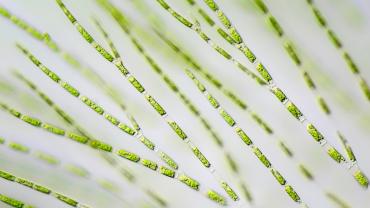
Rhamnan sulfate is an extract from Monostroma nitidum (M. nitidum), a marine plant that is found off the coast of Japan. M. nitidum is a green alga seaweed that is often used for nori in miso soups and other culinary applications. It may also play a potentially health-supportive role in the human body.
The cells of M. nitidum are arranged in a single layer and contain many bioactive micronutrients, including a high amount of chlorophyll, vitamins, polysaccharides, minerals, and proteins. Rhamnan sulfate is a sulfated polysaccharide located in the cell walls of M. nitidum and has been a topic of recent research for its potential to help support certain aspects of cardiovascular function and blood vessel health.
A laboratory and animal study conducted by Patil and colleagues published in Biomaterials, a peer-reviewed journal exploring the clinical application of biomaterials, investigated the potential role of rhamnan sulfate administration in cardiovascular health and endothelial integrity. In the laboratory portion of the study, human coronary artery endothelial cells and vascular smooth muscle cells were assessed for low-density lipoprotein (LDL) cholesterol permeability, inflammatory status, and vascular cell proliferation and migration in the presence of rhamnan sulfate.
Laboratory results indicate that rhamnan sulfate was observed to help support endothelial barrier function and help promote normal cell proliferation and migration. In addition, in the presence of rhamnan sulfate, LDL permeability was reduced by 2.7-fold. Results indicate that rhamnan sulfate exhibited protective qualities to help prevent further LDL deposition.
In the controlled animal portion of the study, ApoE-/- mice were used. ApoE-/- mice are models used to simulate atherosclerotic changes. The mice were fed a high-fat diet for 4 weeks as a baseline. For the treatment period, both the control and treatment groups received high-fat diets for 9 weeks. The treatment group also received 0.75 g per kg of rhamnan sulfate of diet. Study results indicate that the treatment group was observed to experience reductions in markers related to lipid metabolism and the inflammatory response in the presence of rhamnan sulfate administration. These effects were reported to be more pronounced in the female mice in the study.
Patil and colleagues concluded that rhamnan sulfate helped support the barrier integrity of endothelial cells and acted as an inhibitor of nuclear factor-kappa B pathway activation induced by tumor necrosis factor-alpha (TNF-α) in endothelial cells. TNF-α has been linked in the literature to the degradation of the endothelial glycocalyx (EGX). Overall conclusions also suggested that rhamnan sulfate helped support the prevention of the degradation of the EGX and the potential deposition of LDL.
More research is needed, particularly in the clinical setting, yet evidence suggests that rhamnan sulfate may help support certain aspects of vascular health and the inflammatory response. It may also help support healthy aging and cardiovascular integrity.
By Dr. C Ambrose, ND, MAT